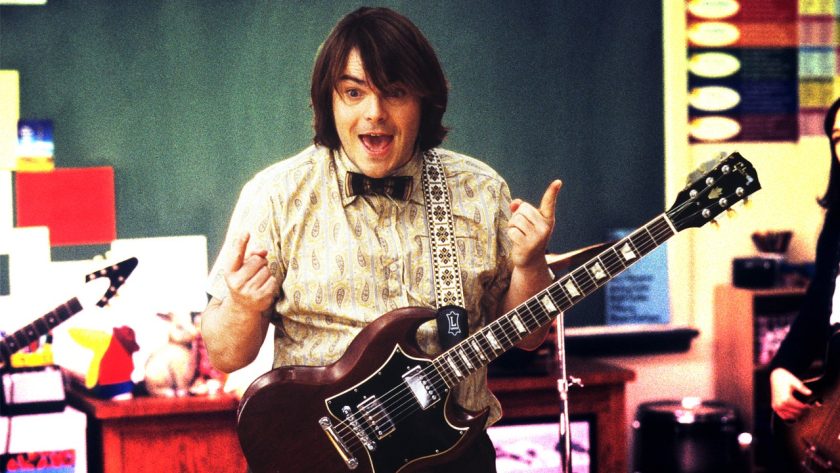We all keep our favorite artists in a little cabinet, arrayed in loose categories. One of the most cherished shelves in mine contains artists I think of as elephant-ballerinas: Great Big Boys who each, in their own way, wrought an art of exquisite delicacy. These include Samuel Johnson; David Crosby; W.C. Fields; Jerry Garcia; and, no greater or lesser a figure than these, Jack Black.
If there’s a single work that captures Black’s magic—his bulldozer energy and virtuosically graceful timing—it isn’t Shallow Hal, it certainly isn’t Nacho Libre, and it isn’t even the first Tenacious D album. It’s a mid-budget comedy released 20 years ago today: the inimitable, immortal School of Rock. Directed by Richard Linklater from a script by Mike White, the movie is transcendently good, and the most perfect conceivable vehicle for Black’s brilliant, Falstaffian energy.
I don’t mean to come off pretentious by invoking Falstaff, the oafish knight who recurs in several Shakespeare plays. It’s undeniable, though, that Falstaff fully anticipates Black’s turn as Dewey Finn. As Harold Bloom wrote in 2017, “Hamlet is death’s ambassador, while Falstaff is the embassy of life.” Replace Hamlet with the school board, and Falstaff with Black, and you’ve got School of Rock, the greatest guitar comedy since Spinal Tap. Delightfully, it is a family comedy that manages to feel edgy even two decades later, perhaps because it is not a portrait of a reformed rogue, but of a rogue actualized.
The film has two main sources of charm. The first is the child actors. When casting them, Linklater took a very Steven Soderbergh approach: hire musicians, not actors, and the acting will come. And did it ever. The kids match Black’s intensity and humor beat for beat, and moreover, they can seriously shred. The second draw is Black’s performance as Dewey, an over-the-hill slacker-rocker who takes a substitute teaching job under false pretenses. The role feels like the fullest expression of the actor-singer’s whole allusive rock shtick: Tenacious D ran so that Dewey Finn could, well, stage-dive.
The plot is a classic fish-out-of-water farce. Dewey, a 40ish schlub with a fetid soul patch and a face like a crazed groundhog, is kicked out of his band, No Vacancy, for being an impossible prima donna whose ego and antics get them banned from venues. Having lost his paltry gigging income, Dewey is ill-prepared when his roommate, Ned Schneebley, demands rent. (Ned, played as a perfect beta by Mike White himself, is influenced by his harpy of a girlfriend, a stereotype that Sarah Silverman chews through and transcends. When Silverman’s character calls him a leech, Dewey retorts, with complete seriousness: “I service society by rocking.”) Dewey, therefore, needs a job. And he takes one as a substitute schoolteacher, pretending to be Ned to get the gig.



